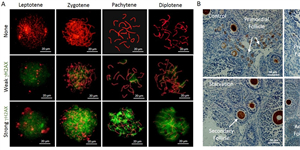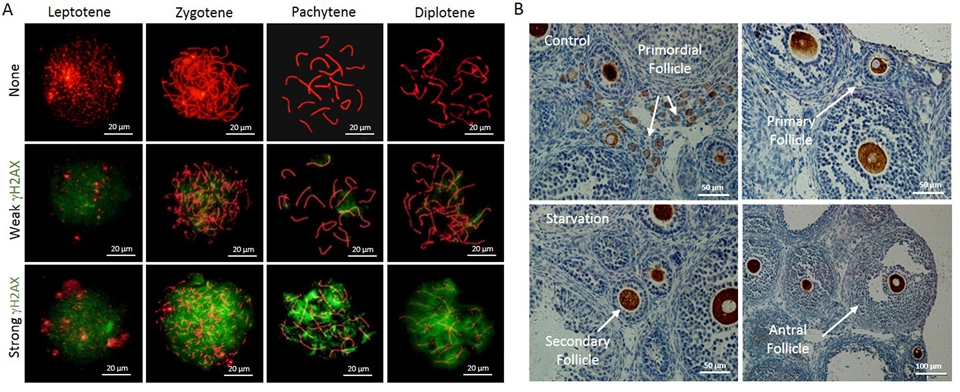Prof. Shen Wei's Research Group:Nutritive Deficiency During Pregnancy Affects Offspring's Reproducti
2018-06-18 10:17:08 views:0

Recently, the research group led by Prof. Shen Wei, a professor with the School of Life and Science and the Institute of Reproductive Sciences of Qingdao Agricultural University(QAU), has published a paper entitled Starvation during pregnancy impairs fetal oogenesis and folliculogenesis in offspring in the mouse on the international biomedical academic journal Cell Death & Disease (the influence factor is 6.147 in the past five-year period). The research was funded by the National Major Scientific Research Program (973) Project and the National Natural Science Foundation Project. Wang Junjie and Yu Xiaowei, two graduate students of Prof. Shen Wei, are co-first authors of the article, and Prof. Shen Wei is the corresponding author.
With the development of modern medicine, it is generally recognized that the maternal body during pregnancy is very sensitive to adverse external factors, especially the deficiency of essential nutrients will inevitably affect the normal development of the fetus, and even cause the occurrence of related diseases in later generations. Some researchers have found that the occurrence of some diseases such as obesity, diabetes and cardiovascular diseases are closely related to the improper diet during pregnancy. However, little is known about the impact of nutritional deficiency during pregnancy on the reproductive system development of offspring.
Prof. Shen Wei's research group used the gestational mouse model to study the fetal development after short term starvation treatment. The study found that nutritive Deficiency during pregnancy will firstly cause weight reduction of the fetus and placenta, resulting in increased DNA damage of the oocyte during the development of the fetus ovary, abnormalities in homologous recombination of meiotic chromosomes, and an increase in the proportion of cell apoptosis. In order to further analyze its mechanism, the RNA-seq analysis of fetal ovaries was carried out in this study. It was found that most of the genes showing differences in expression in fetal ovaries were closely related to metabolic pathways. In addition, nutritive Deficiency of mother during pregnancy also hinders the formation of primordial follicles after the birth of the offspring, reduces the reserve of oocyte, and may lead to premature ovarian aging. Further studies confirm that after the growth of these offspring to puberty, follicular development in their ovaries is indeed affected to some extent. The results of these studies effectively show that oogenesis is susceptible to maternal microenvironment; maternal nutrition intake during pregnancy is of great importance to the normal development of the fetal reproductive system; and unreasonable diet of mother will affect the reproductive ability of offspring. This research will provide scientific and effective guidance for the clinical application of human prenatal and postnatal care and assisted reproduction.
At the same time, the nutritional intake of newborns has a great impact on their own fertility. In 2017, the research group of Prof. Shen Wei published the research results of effect of neonatal nutrition deficiency on ovarian development in the same publication Cell Death & Disease, and the paper was paid attention by F1000Prime as a highlight of special research significance in the field of reproductive biology. The famous reproductive biologist, Professor Keith Jones of Southampton University in the UK, commented on it emphatically.
In recent years, the research group of Prof. Shen Wei has been devoted to the research on the mechanism of oogenesis. They have published academic papers in important international journals to explain the regulatory mechanism of oogenesis and the research strategy of realizing oogenesis in vitro. Complete in Vita Oogenesis: Retrospects and Specialties, another paper by one of the authors of this paper Wang Junjie, was published in Cell Death & Differentiation (Influence Factor being 8.339).
Link to the paper: https://www.nature.com/articles/s41419-018-0492-2

Qingdao Agricultural University
About QAU | | Research | International | Alummi | Study At QAUAddress:No. 700 Changcheng Road, Chengyang, Qingdao, Shandong, China. P.C. 266109
Web Design: News Center of Qingdao Agricultural University.




